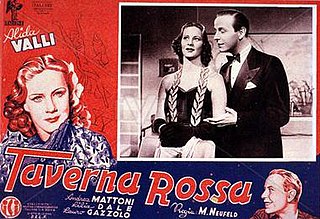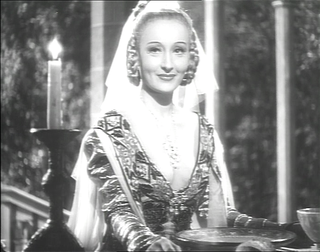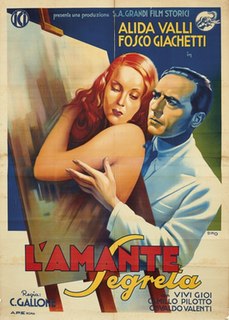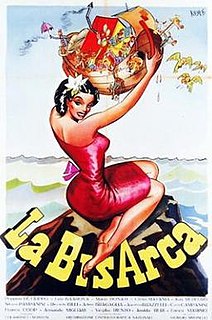
Telefoni Bianchi films were made by Italian film industry in the 1930s and the 1940s in imitation of American comedies of the time in a sharp contrast to the other important style of the era, calligrafismo, which was highly artistic. The cinema of Telefoni Bianchi was born from the success of the Italian film comedy of the early 1930s: it was a lighter version, cleansed of any intellectualism or veiled social criticism.

Amedeo Nazzari was an Italian actor. Nazzari was one of the leading figures of Italian classic cinema, often considered a local variant of the Australian-American star Errol Flynn. Although he emerged as a star during the Fascist era, Nazzari's popularity continued well into the post-war years.

Light in the Darkness is a 1941 Italian drama film directed by Mario Mattoli and starring Fosco Giachetti, Alida Valli and Clara Calamai. The film's sets were designed by the art director Ottavio Scotti. It was shot at the Palatino Studios in Rome.
Invisible Chains is a 1942 Italian drama film directed by Mario Mattoli and starring Alida Valli, Carlo Ninchi and Giuditta Rissone. It was shot at the Cinecittà Studios in Rome. The film's sets were designed by the art directors Ottavio Scotti and Mario Rappini.

Carlo Ninchi was an Italian film actor. He appeared in more than 120 films between 1931 and 1963. He was born in Bologna, Emilia-Romagna, and died on 27 April 1974 in Milan, Lombardy, Italy.
The Gates of Heaven is a 1945 Italian drama film directed by Vittorio De Sica.
Dora Nelson is a 1939 Italian comedy film directed by Mario Soldati and starring Assia Noris, Carlo Ninchi and Luigi Cimara. It is a remake of the 1935 French film of the same title, which was based on a play by Louis Verneuil. The film was shot at Cinecittà in Rome, with several real employees of the studio appearing as themselves.

Headlights in the Fog is a 1942 Italian drama film directed by Gianni Franciolini and starring Fosco Giachetti, Luisa Ferida and Antonio Centa. The film's art direction was by Camillo Del Signore. It was made at the Palatino Studios in Rome and on location in Piedmont and Liguria.

The Ferocious Saladin is a 1937 Italian "white-telephone" comedy film directed by Mario Bonnard and starring Angelo Musco, Alida Valli and Lino Carenzio. The film was made at Cinecittà in Rome. On 28 April 1937, Benito Mussolini visited the newly completed studio. Along with the historical epic Scipio Africanus, this was one of the films he saw being made. The film, a vehicle for the Sicilian comedian Angelo Musco, is about an unsuccessful old comedian forced to find another work. While he is selling cakes in a theatre, the audience discover the highly sought-after collectible cards of "The Ferocious Saladin". Inspired by the event, the comedian sets up a successful comic piece on stage.

Red Passport is a 1935 Italian historical drama film directed by Guido Brignone and starring Isa Miranda, Filippo Scelzo and Ugo Ceseri. A group of Italian immigrants to South America join in a revolution.

Mino Doro was an Italian actor who appeared in more than a hundred films between 1932 and 1970. Doro generally played supporting and character roles. He appeared as a blackshirt in the 1934 Fascist propaganda film The Old Guard.

Red Tavern is a 1940 Italian "white-telephone" comedy film directed by Max Neufeld and starring Alida Valli, André Mattoni, and Lauro Gazzolo. It was made at Cinecittà in Rome. A young woman eventually marries a count after a series of misunderstandings.

Unjustified Absence is a 1939 Italian "white-telephone" comedy film directed by Max Neufeld and starring Alida Valli, Amedeo Nazzari and Lilia Silvi. A girl leaves school to marry a doctor, but becomes annoyed by his constant absences and decides to secretly resume her studies.

Lilia Silvi was an Italian film actress. Silvi was one of several young actresses presented as an Italian equivalent to the Canadian-born Hollywood star Deanna Durbin. She appeared opposite Amedeo Nazzari, the most popular Italian star of the era, in five films.

The Jester's Supper is a 1942 Italian historical film directed by Alessandro Blasetti and starring Amedeo Nazzari, Osvaldo Valenti and Clara Calamai. It was based on a play of the same title by Sem Benelli, which had later been turned into an opera by Umberto Giordano. Like the play, the film is set in the 15th century Florence of Lorenzo the Magnificent and portrays a rivalry that leads to a series of increasingly violent practical jokes.

The Secret Lover is a 1941 Italian drama film directed by Carmine Gallone and starring Alida Valli, Fosco Giachetti and Vivi Gioi. It was made at Cinecittà in Rome.

The Transporter is a 1950 Italian comedy science fiction film directed by Giorgio Simonelli and starring Peppino De Filippo, Silvana Pampanini, Lída Baarová and Aroldo Tieri. It is based on a radio program with the same name.

Napoleon is a 1951 Italian comedy film directed by Carlo Borghesio and starring Renato Rascel in the title role.

Then We'll Get a Divorce is a 1940 Italian "white-telephone" comedy film directed by Nunzio Malasomma and starring Amedeo Nazzari, Vivi Gioi and Lia Orlandini.

The Taming of the Shrew is a 1942 Italian comedy film directed by Ferdinando Maria Poggioli and starring Amedeo Nazzari, Lilia Silvi and Lauro Gazzolo. It is based on William Shakespeare's play The Taming of the Shrew, with the setting updated to modern-day Rome.

















